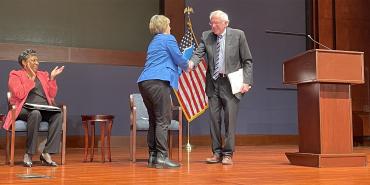Sen. Bernie Sanders (I-Vt.) shined a spotlight on the teacher shortage at the “Respecting Our Teachers: A Town Hall on the Teacher Pay Crisis in America,” held on Capitol Hill Feb. 13. With speakers including AFT President Randi Weingarten, National Education Association President Rebecca Pringle, Sen. Ed Markey (D-Mass.) and the people closest to this problem—working educators—the event laid out what Sanders calls the “unconscionable” working conditions that have prompted so many people to leave the profession.
“In the richest country in the history of the world, each and every person must be able to get the education they need to fulfill their dreams,” said Sanders. “That means we need the best education system in the world, and that means we need the best teachers. Teachers have one of the toughest and most demanding jobs, and we must stand up and support them.”
Sanders, who is chairman of the Senate Committee on Health, Education, Labor and Pensions called the town hall so that he could listen to firsthand accounts from educators struggling with low pay and low morale on the job. He also announced that he will be introducing legislation, the Pay Teachers Act, which will triple Title I funding, invest in federal programs to support educators and ensure that all starting teachers are paid at least $60,000 a year.
Chronic understaffing and low pay
“In America today, over half of our public schools are understaffed, and to make matters even worse these teacher shortages disproportionately impact schools that primarily serve students of color and students in low-income neighborhoods,” said Sanders. “That is not acceptable.”
Sanders went on to say that 44 percent of public school teachers quit the profession within five years, and one of the primary reasons is “pathetically low” pay. “In America today, the starting pay for teachers in almost 40 percent of our school districts is less than $40,000 a year,” he said. “Further, 43 percent of all teachers in America make less than $60,000 a year.”
“Teachers are nation builders,” said Weingarten. “We are the pillars of democracy. We prepare our kids to be caretakers of tomorrow’s environment. We prepare the sparks that ignite innovation; we prepare the tenders of global relationships; we prepare the guardians of our prosperity; we prepare the creators of our arts. It’s important to place a value on what teachers do. … Frankly pay is a way to do that.”
“What we have across this country is a shortage of professional pay for our educators,” said Pringle. “We have a shortage of basic dignity, a shortage of respect for the people who have dedicated their lives to educating America’s students—which means we have a shortage of people who are willing to take on the immense responsibility without the requisite recognition of the critical role they plan in our society and in this democracy.”
Why we leave the profession
Educators are dedicated to their students and understand the essential role they play not just to teach them, but also to care for them. “Schools being first responders is absolutely true,” said Jacob Fertig, an AFT member who teaches art in low-income, high-need schools in West Virginia, referring to a comment Weingarten had made earlier in the program. In his state, more than 10,000 children are considered homeless, and more than 7,000 are in foster care.
The first time anyone learns about a child’s struggles is often when the child tells a teacher or custodian, said Fertig. Yet educators get little respect for the crucial jobs they do. The starting salary in West Virginia is $39,000, he said. The state has a 1,500 teacher shortage, not including positions filled with uncertified people.
Traci Tucker, an AFT member who teaches special education in Brooklyn, N.Y., started out as a paraprofessional and couldn’t afford to do the unpaid field work and practicum required to become a teacher. She was finally able to enroll in a career training program that made her goal financially possible, but Tucker said it shouldn’t require that she happened to have an education professor who put in extra hours writing grant proposals and ferreting out opportunities for aspiring teachers. “It should be part of a career ladder,” she said.
Educators described working second and third jobs to make ends meet; short staffing that requires teachers to cover for colleagues and spread themselves too thin; and career and technical school instructors leaving for private sector jobs that pay two and three times more than schools. And the emotional and mental toll of chronic disrespect weighs on all education workers.
But many persist. Arthur Anderson, an NEA member and teaching assistant from Virginia, remembers what it was like to have a learning disability in school, and is passionate about supporting children like him. “I understand what it is to be them,” he said. But after 31 years as a teaching assistant, driving the bus and working as a part-time custodian, he didn’t even make $31,000 until this year.
Alison Sylvester, an NEA member and middle school social studies teacher from Springfield, Vt., described the thrill she experiences when a student reads her first word, learns to divide a fraction, or does her first layup in a basketball game—those moments are the reason Sylvester loves her job. But, she said, “They’re not always enough.” Educators so often put the children first and neglect their own lives, she said, donating countless hours after school, on weekends, during breaks and over the summer. They take classes that they pay for themselves and spend their own money on snacks for their students. “We have to support our educators,” said Sylvester.
Solutions to a systemic problem
Sanders asked the educators: Why is teacher pay so low? Tucker, the Brooklyn teacher, suggested it’s because “Education is power. Knowledge is power. And it’s a power that’s been held back from so many groups of people,” including times when illiterate people were prevented from voting. “So perhaps there’s a fear that when you educate people, you lose some control.”
Sylvester added that the majority of educators have been women, implying that women are frequently undervalued and underpaid.
Sanders pointed out that paying teachers a decent wage is a drop in the bucket compared with what the nation spends on other priorities. “It is about time that we got our national priorities right,” he said, referring to child poverty, hunger and homelessness. “If we can provide over a trillion in tax breaks to the top 1 percent and large corporations, please don’t tell me that we can’t make sure that every teacher in America is paid $60,000 a year.”
“We’re not asking for the moon,” said Weingarten. “Every teacher should earn enough to afford life’s necessities and raise a family comfortably. Enough to pay the student loans. Enough to afford to live in or near the communities where we teach, and to offset the hundreds of thousands of dollars we all spend on supplies, snacks, treats, clothing, etc., etc.”
In addition to higher pay to retain and attract educators, the teachers and aides at the event suggested other crucial improvements to schools, including wraparound social services, community schools and staffing up to be able to provide more trauma-informed care. “Paying teachers is necessary but not sufficient,” said Weingarten. “We have a shortage of professional working conditions. We have a shortage of pay, but we also have a shortage of respect and dignity and voice.”
[Virginia Myers]


